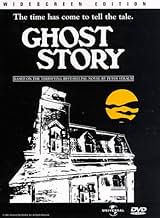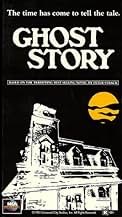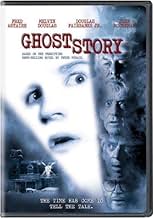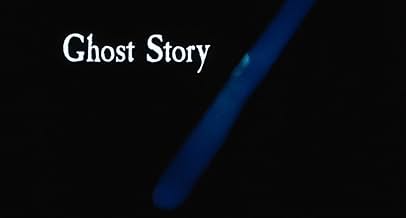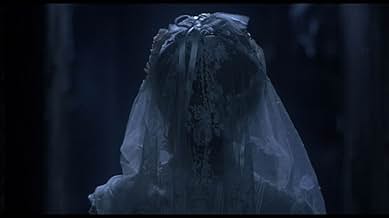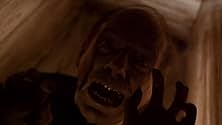VALUTAZIONE IMDb
6,3/10
10.596
LA TUA VALUTAZIONE
Aggiungi una trama nella tua linguaTwo generations of men find themselves haunted by the presence of a spectral woman. When the son of one of the elderly men returns to his hometown after his brother's mysterious death, they ... Leggi tuttoTwo generations of men find themselves haunted by the presence of a spectral woman. When the son of one of the elderly men returns to his hometown after his brother's mysterious death, they attempt to unravel her story.Two generations of men find themselves haunted by the presence of a spectral woman. When the son of one of the elderly men returns to his hometown after his brother's mysterious death, they attempt to unravel her story.
- Premi
- 3 candidature totali
Recensioni in evidenza
... with a fantastic cast of veterans - Fred Astaire, John Houseman, Melvyn Douglas, Douglas Fairbanks Jr, and Patricia Neal. Unfortunately, the film always keeps getting in the way, leaving the veterans with scant onscreen attention.
The tale concerns a group of men, haunted by a death they were all accidentally responsible for in the early 1930s, and what happens when the ghost of that victim (Alice Krige) returns for vengeance, resulting in a lot of men shocked to death and abrupt shock cuts that show a rotting corpse in place of Krige's face. Unfortunately, maybe because of studio interference, the majority of screentime goes to Craig Wasson as a pair of Fairbanks' identical twin sons, one ill-fated very early on, the other more successful in surviving. Frankly put, although he isn't bad in the film, it feels like false advertising. (Wasson also has to have one of the tackiest death scenes in cinema history as the ill-fated brother who, terrified by Krige's skeletal look after a night of sex, plunges backwards stark naked from a high-rise window, as the film shows him against a badly processed back projection flailing his arms about, while his private parts flutters every which way like a Planters peanut caught in a strong wind). There's a reason Krige goes after the next generation in the case of Fairbanks' sons, but you'll have to watch and find out what that reason is.
So, Astaire and all the others I came to see are left with mere onscreen scraps, and are left with unformed characterizations. That feels like a grave betrayal for this classic film fan, especially in the light that it was the final film for Astaire, Douglas, and Fairbanks.
There were some particularly well-done parts though. For one Alice Krige was perfect for her part because her porcelain doll looks make her appear to be somebody out of an earlier time. Winter in the New England town the veteran actors live in has the look of a place that's haunted - it's very atmospheric. And finally, the film points out how having a crisis at 20 rather than 30 makes all the difference in the world as to the calmness and wisdom with which that crisis is handled.
The tale concerns a group of men, haunted by a death they were all accidentally responsible for in the early 1930s, and what happens when the ghost of that victim (Alice Krige) returns for vengeance, resulting in a lot of men shocked to death and abrupt shock cuts that show a rotting corpse in place of Krige's face. Unfortunately, maybe because of studio interference, the majority of screentime goes to Craig Wasson as a pair of Fairbanks' identical twin sons, one ill-fated very early on, the other more successful in surviving. Frankly put, although he isn't bad in the film, it feels like false advertising. (Wasson also has to have one of the tackiest death scenes in cinema history as the ill-fated brother who, terrified by Krige's skeletal look after a night of sex, plunges backwards stark naked from a high-rise window, as the film shows him against a badly processed back projection flailing his arms about, while his private parts flutters every which way like a Planters peanut caught in a strong wind). There's a reason Krige goes after the next generation in the case of Fairbanks' sons, but you'll have to watch and find out what that reason is.
So, Astaire and all the others I came to see are left with mere onscreen scraps, and are left with unformed characterizations. That feels like a grave betrayal for this classic film fan, especially in the light that it was the final film for Astaire, Douglas, and Fairbanks.
There were some particularly well-done parts though. For one Alice Krige was perfect for her part because her porcelain doll looks make her appear to be somebody out of an earlier time. Winter in the New England town the veteran actors live in has the look of a place that's haunted - it's very atmospheric. And finally, the film points out how having a crisis at 20 rather than 30 makes all the difference in the world as to the calmness and wisdom with which that crisis is handled.
When this film was first released, it was greeted with a sense of disappointment. Many felt it did not do Peter Straub's source novel justice.
I thought this was an unfair judgement at the time, and watching the film again today confirms this belief. "Ghost Story" does not attempt to emulate the complexity of Straub's epic tale : that would have been impossible. But it does distil the essence of that story - four ageing men haunted by a terrible tragedy from their youth - and puts it on screen with chilly precision.
With some masterly photography and a recurring motif of running water (most dramatically in the truly scary bathtub scene), Irvin imbues the film with a real chill of the grave feel. The ending, as Alma descends the staircase of her decaying house in her wedding dress, isn't a gorefest : there are no elaborate effects or dramatic battles between good and evil. But it is subtly terrifying nonetheless.
Just about all the IMdB reviews, good or bad, have praised Alice Krige's performance. For such a young actress, she's simply stunning. It's a brave, brilliant portrayal. A feminist reading of the film could argue that the real horror lies in the inability of men (and especially the callow youngsters featured in the 20s flashback) to cope with a powerful, sexually-assertive woman.
This is a clever, stylish film which lends itself to differing interpretations. It creates more elegant frissons of fear than almost any other 80s horror film.
I thought this was an unfair judgement at the time, and watching the film again today confirms this belief. "Ghost Story" does not attempt to emulate the complexity of Straub's epic tale : that would have been impossible. But it does distil the essence of that story - four ageing men haunted by a terrible tragedy from their youth - and puts it on screen with chilly precision.
With some masterly photography and a recurring motif of running water (most dramatically in the truly scary bathtub scene), Irvin imbues the film with a real chill of the grave feel. The ending, as Alma descends the staircase of her decaying house in her wedding dress, isn't a gorefest : there are no elaborate effects or dramatic battles between good and evil. But it is subtly terrifying nonetheless.
Just about all the IMdB reviews, good or bad, have praised Alice Krige's performance. For such a young actress, she's simply stunning. It's a brave, brilliant portrayal. A feminist reading of the film could argue that the real horror lies in the inability of men (and especially the callow youngsters featured in the 20s flashback) to cope with a powerful, sexually-assertive woman.
This is a clever, stylish film which lends itself to differing interpretations. It creates more elegant frissons of fear than almost any other 80s horror film.
I read Peter Straub's book and was quite pleased with the result of the movie. First of all, like many, I loved the cast. They are all great men of the world cinema and the pull off the story with great aplomb. The movie is about something someone does in his or her youth and then must live with forever. In a good ghost story, the characters get no points for being once youthful and reckless. The fact that they meet and share their stories means that they never seem to intend closure. They never allow themselves to face the music and, hence, the revenge of the spirit is acceptable in the world where they find themselves. I just thought that a society devoted to the telling of ghost stories was a great idea. Anyway, while the plot does wander around a bit and it takes time to get to the point, it still works great. It was nice to see that Fred Astaire could still act (because he was such a great dancer we forget that he had a great comic talent and, in this case, a dramatic talent). The others are equally formidable. There are also some pretty slimy, putrid visions that appear and make for a pretty good rank on the jump scale. The actually scene that explains everything (I won't spoil it) is both sad and revealing. While not the greatest movie, it works very well and I would recommend it.
"Ghost Story" charts two generations of men who find themselves being stalked by the vengeful spirit of a woman, hellbent on revenge against four elderly New England plutocrats who share a fifty year-old secret. When one of the men's sons returns to town after his brother's mysterious death, they are forced to unravel the story behind her.
Based on Peter Straub's wildly successful novel, "Ghost Story" came about during the peak of the slasher film and is one of the few remembered supernatural horror films of the eighties. Straub's source novel is probably one of the greatest American ghost novels ever written, and some people have found the adaptation unforgivable, as it does excise a great deal from the book; I personally am able to get past this.
What "Ghost Story" really is is a dark drama with a splash of horror, and this also has been a point of contention for genre fans. The film moves at a leisurely pace, and the scares are few and far between, but what director John Irvin does supply the audience is a profound atmosphere and general sense of weirdness that is unforgettable. The wintry Vermont landscape, the stuffy drawing rooms of the old men, and the abandoned mansion on the hill all provide a somber and pastoral backdrop that lend to the film's icy old-fashioned feel, and comparisons to "The Woman in Black" are well-earned.
The cast is one of the major selling points here: Fred Astaire, Melvyn Douglas, Douglas Fairbanks, John Houseman, and Patricia Neal round out a roster of classic Hollywood stars in their old age (for many, this was their last film). Craig Wasson plays two roles of the second generation, with Alice Krige as the haunting woman that runs between them. The acting is solid overall, though some of the older cast feel a bit underused; I think that may have to do with some wonky editing in the film, which is one of its few downfalls. It also feels dated at times, though not to its detriment.
Overall, "Ghost Story" is no less a well-made film with a classic, ghastly edge to it. It is a slow film in many ways, but the subtlety employed here combined with the bleak and picturesque New England winterland really made this an enjoyable experience. There are some phenomenal Gothic images throughout, and the story itself has a certain timelessness to it in spite of the film's more dated qualities. Memorable and atmospheric for a variety of reasons. 8/10.
Based on Peter Straub's wildly successful novel, "Ghost Story" came about during the peak of the slasher film and is one of the few remembered supernatural horror films of the eighties. Straub's source novel is probably one of the greatest American ghost novels ever written, and some people have found the adaptation unforgivable, as it does excise a great deal from the book; I personally am able to get past this.
What "Ghost Story" really is is a dark drama with a splash of horror, and this also has been a point of contention for genre fans. The film moves at a leisurely pace, and the scares are few and far between, but what director John Irvin does supply the audience is a profound atmosphere and general sense of weirdness that is unforgettable. The wintry Vermont landscape, the stuffy drawing rooms of the old men, and the abandoned mansion on the hill all provide a somber and pastoral backdrop that lend to the film's icy old-fashioned feel, and comparisons to "The Woman in Black" are well-earned.
The cast is one of the major selling points here: Fred Astaire, Melvyn Douglas, Douglas Fairbanks, John Houseman, and Patricia Neal round out a roster of classic Hollywood stars in their old age (for many, this was their last film). Craig Wasson plays two roles of the second generation, with Alice Krige as the haunting woman that runs between them. The acting is solid overall, though some of the older cast feel a bit underused; I think that may have to do with some wonky editing in the film, which is one of its few downfalls. It also feels dated at times, though not to its detriment.
Overall, "Ghost Story" is no less a well-made film with a classic, ghastly edge to it. It is a slow film in many ways, but the subtlety employed here combined with the bleak and picturesque New England winterland really made this an enjoyable experience. There are some phenomenal Gothic images throughout, and the story itself has a certain timelessness to it in spite of the film's more dated qualities. Memorable and atmospheric for a variety of reasons. 8/10.
Four elderly men members of The Chowder Society fall victim to a vengeful ghost (Alice Krige) who seems to be connected to something they did decades ago and who once dated one of the member's son (Craig Wasson) from beyond the grave. Old fashioned, entertaining film features possibly the best cast ever gathered to star in a horror film. The film itself has a very atmospheric feel to it and generates some suspense, but never really scares the auidence.
Rated R; Nudity, Sexual Situations, Violence, and Profanity.
Rated R; Nudity, Sexual Situations, Violence, and Profanity.
Lo sapevi?
- QuizFinal theatrical feature film of veteran actors Melvyn Douglas, Fred Astaire, and Douglas Fairbanks Jr.
- BlooperRobert Burr is credited as " Principal ". Since the school in the film is a college, his title in the credits should be " Dean ".
- Versioni alternativeThe Australian theatrical version was cut to receive a more commercial 'M' rating (all ages admitted but recommend for 15 and over) rather then an 'R' rating (restricted to 18 years and over).
- Colonne sonoreSweetheart of Sigma Chi
Written by F. Dudleigh Vernor and Byron D. Stokes
Performed by Guy Lombardo and The Royal Canadians (as His Royal Canadians)
I più visti
Accedi per valutare e creare un elenco di titoli salvati per ottenere consigli personalizzati
Dettagli
Botteghino
- Budget
- 13.500.000 USD (previsto)
- Lordo Stati Uniti e Canada
- 23.371.905 USD
- Fine settimana di apertura Stati Uniti e Canada
- 2.105.729 USD
- 20 dic 1981
- Lordo in tutto il mondo
- 23.371.905 USD
- Tempo di esecuzione
- 1h 50min(110 min)
- Mix di suoni
- Proporzioni
- 1.33 : 1(original ratio, open matte)
Contribuisci a questa pagina
Suggerisci una modifica o aggiungi i contenuti mancanti






